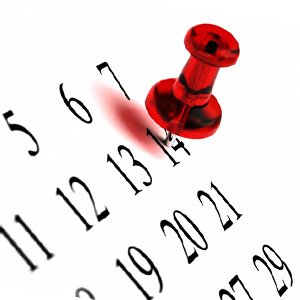To Date or Not To Date (Your Blog Posts)

All around the blogosphere we read stacks of articles on how to make WordPress better, from heading off fatal problems that could break our baby to enticing it to make our money-making dreams come true. Somewhere in the middle of that spectrum sits your date, virtually ignored. To date or not to date, that is the question!
The Dating Game
What if you woke up, looked at the calendar on the wall, and all the blocks were blank? Or you glanced at your smartphone, only to discover everything date-related had disappeared? You wouldn’t think that little handheld was so smart, would you?
We know why knowing the date is important: appointments, deadlines, doctor visits, payday . . . So why do we think hiding the date on articles and blog posts is such a great idea?
I think the reason most people leave the date off is so that their content won’t appear “dated.” Dated is synomymous with “old,” and who wants their content to appear old when someone arrives for the first time? ”Old” online is a faulty anachronism: it’s the difference between ancient and antique. An antique is a desirable form of something from another time. It might be old, but it’s valuable and considered priceless by some.
Keeping That Date
The choice is always yours. Let’s look at some reasons to keep the date and make sure it is readily visible when someone drops in.
Being Relevant
Imagine stumbling across a news story that said something like “breaking news!” … You read the story and don’t realize this was something that happened over 2 years ago. — DialMe
“DialMe” makes a solid point in Timestamping Articles and Posts. Since your About Me or Contact pages are more or less static content, they don’t necessarily need to show when they were published. But adding a date to blog posts and articles will give readers an opportunity to decide for themselves if your content is relevant to their needs. It could also be the deciding factor in whether your visitor leaves a comment or asks an important question.
Being A Standup Kinda Guy (or Gal)
Content that has been around for a while could be considered anchor, pillar, or evergreen content — the kind of content that stands up to the passing of time. It provides information that is as relevant to the current time as it was when it was first written. A first-timer who lands on your article will be grateful to you — if you provide the answer she was seeking — no matter when it was written.
Examples of evergreen content include articles on how to increase customer referrals, hurricane survival tips, or how to leave a positive blogging legacy. Because this type of content is timely (and priceless), showing the date is less important than adding a date to blog posts where timestamping matters more.
Being on Time
I recently did a roundup of the best blog monetizing strategies over the past year. What if none of the articles had dates? My research would be screwed and my results would have been skewed! In fact, one of the strategies is about traffic generating contests and contests always have a start date and finite ending — so if the date of the post is left off, it could confuse would-be contestants.
Hey, Where’s My Date?
Blame it on the theme
Some themes don’t make it easy to add the date. Either the complexity of navigating options or the sheer number of options could effectively hide the feature. At the time of writing, I’m using the comprehensive Suffusion Theme by Sayontan Sinha. When I first installed it, it took me forever to locate the “show date” feature! However, once found, I was delighted to see a number of options for both displaying the date and leaving it hidden.
Lots of places to stash your date …
Your theme might allow you the freedom of displaying the date in lots of different ways or it might constrain you to only one or two locations. Here are some possible locations:
- above the blog post
- directly under the article title
- a small icon on the left side
- a small icon on the right side
Are you the one looking for a date?
What if you’re doing research for a topic and find an article you’d like to reference but it doesn’t have a date in one of the usual places? If you don’t see the date at first glance, try peeking in these unusual places.
- in the sidebar
- at the very bottom of the post
- in the footer
Lastly, check the comments . . .
Why would you check the comments? They might have a clue! Check the date of the first comment as well as the last comment. The first one will give you an idea of when the post was written. The last one will give an idea of whether or not the content is still relevant.
This almost brings us to the end of our time together …
Ditching Your Date
Like most stories in life, there are two sides to this one, too. In the dating game, the case can also be made against showing the date or timestamp on your blog posts, articles, and tutorials.
Are you hiding something from me?
I already mentioned how certain pages don’t really need a date. That’s not so much about hiding the date as it is about making a practical decision. We also covered evergreen or pillar content, so you could turn the date off on those, too, if you want. But next up is a case in which these fellows really do have something to hide! Read on …
Uh, Google made me do it!
We decided that more often than not, we would want to hide the date . . . But . . . we wanted an option to keep the date on a post if we felt readers would benefit from knowing the date of publication. — Dan Johnson
Dan Johnson and his buddy Ben Hunt claimed that Google slapped them for having old content, until they realized their clickthrough rates were actually suffering because they had dates on the older articles. The gist of it is that Google now displays a date alongside search results (SERPs); thus, someone encountering your relevant (evergreen) article that is dated several years ago will be less inclined to visit your post if they assume your information is outdated.
Once they figured out why the SERPs were causing them pain, they created a tutorial on how to remove the dates from SERP Snippets.
Time to Pop the Question!
Adding dates to blog posts and articles assures visitors that your content is relevant to their needs. Yet, sometimes it might be appropriate to hide the dates.
Well, it’s time to say goodbye, but before you go, I’d like to hear your thoughts on this dating game . . . (and thanks for reading!)
- Do you include dates on your blog posts or do you leave them off? Why?
- Have you ever thought about it one way or the other?
- What are other reasons to add a date or skip including them?
Image: © Olivier Le Moal – Fotolia.com
 Is a Custom Design Essential to Your Blog’s Success?
Is a Custom Design Essential to Your Blog’s Success? 5 Blogging Limiting Beliefs about Money that You Need to Release
5 Blogging Limiting Beliefs about Money that You Need to Release What’s Up Bloggers! Roundup #8 with Don Sturgill
What’s Up Bloggers! Roundup #8 with Don Sturgill What is Keeping Your Blog from Making Money?
What is Keeping Your Blog from Making Money?
{ 53 Responses }